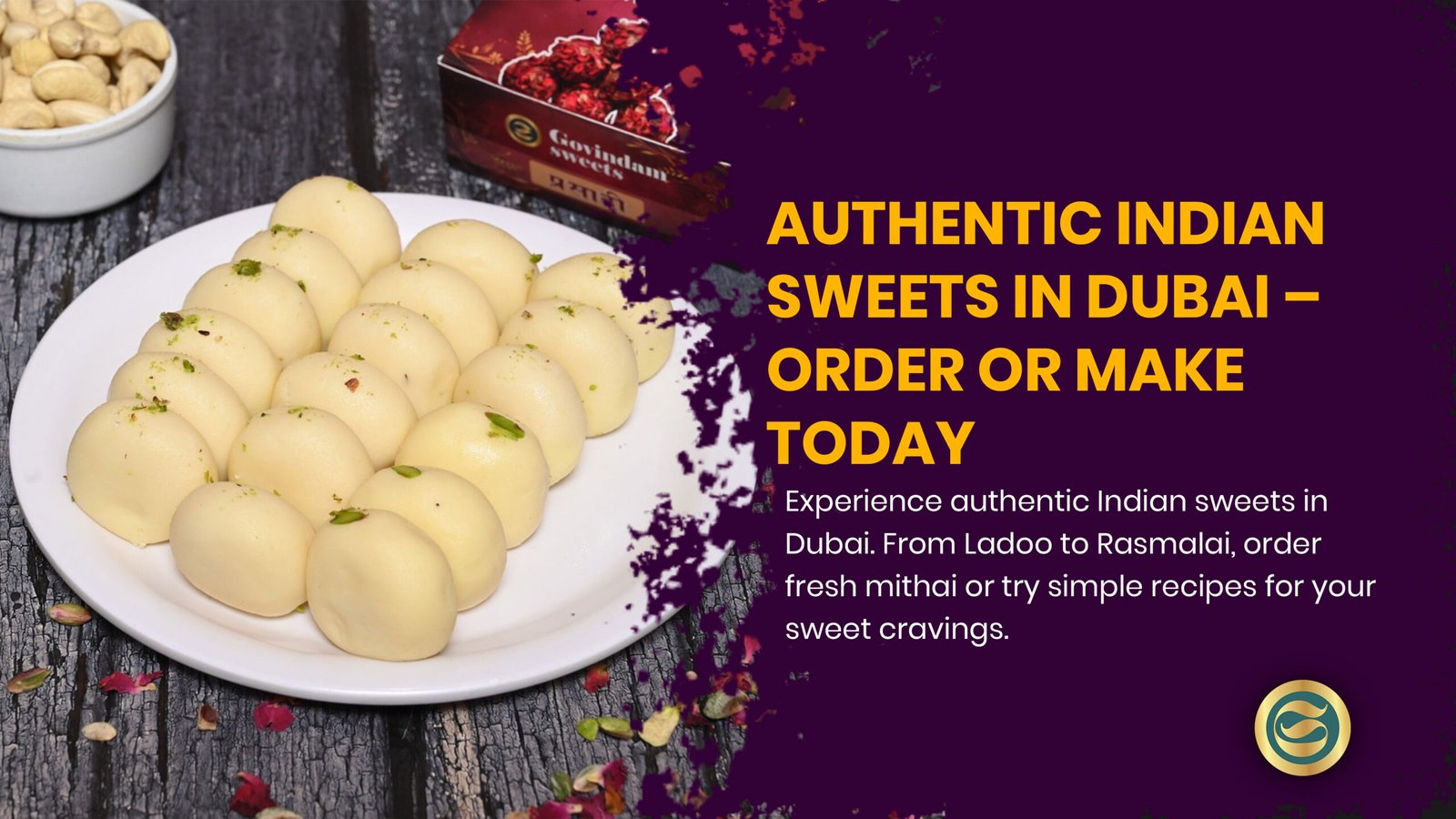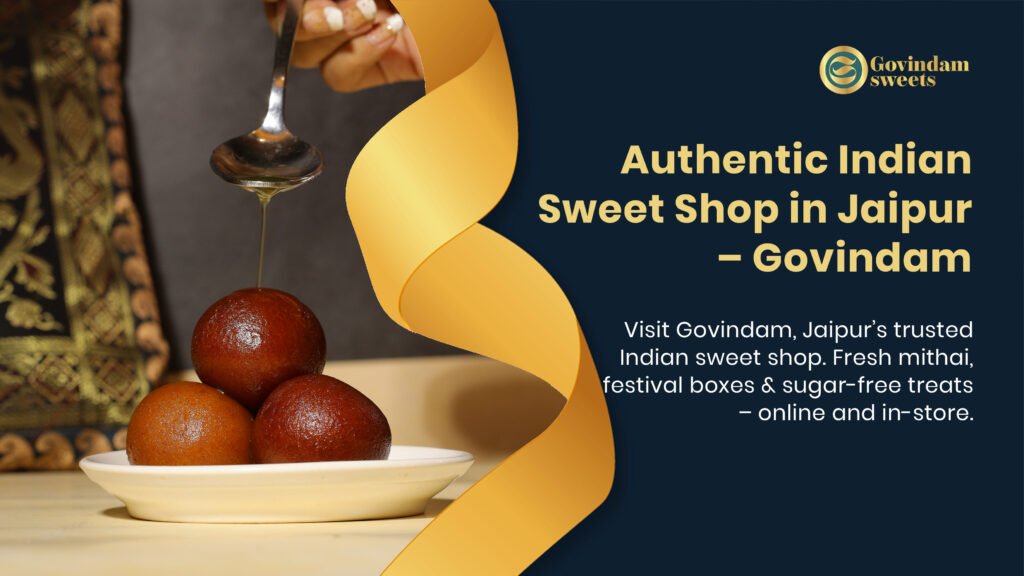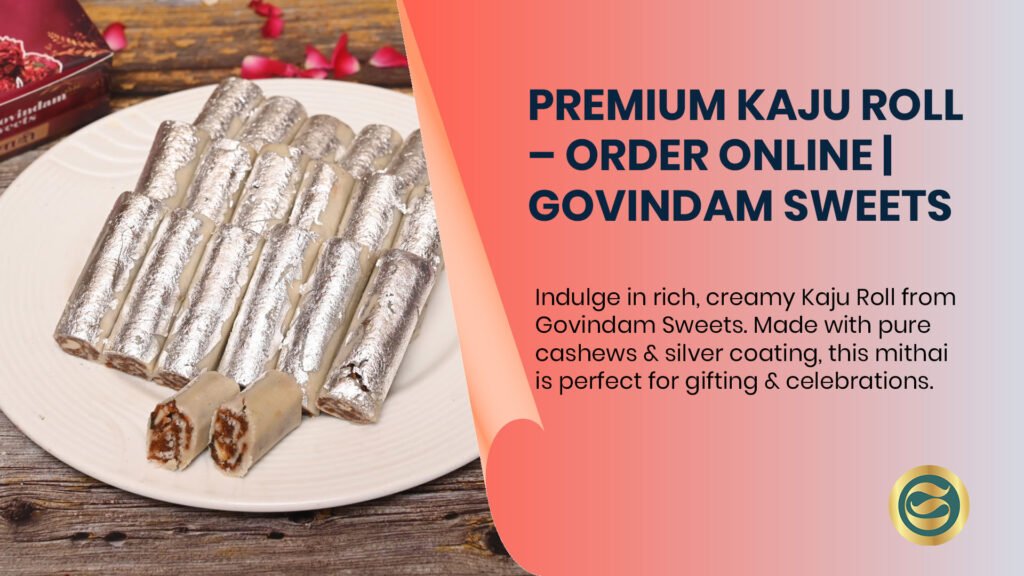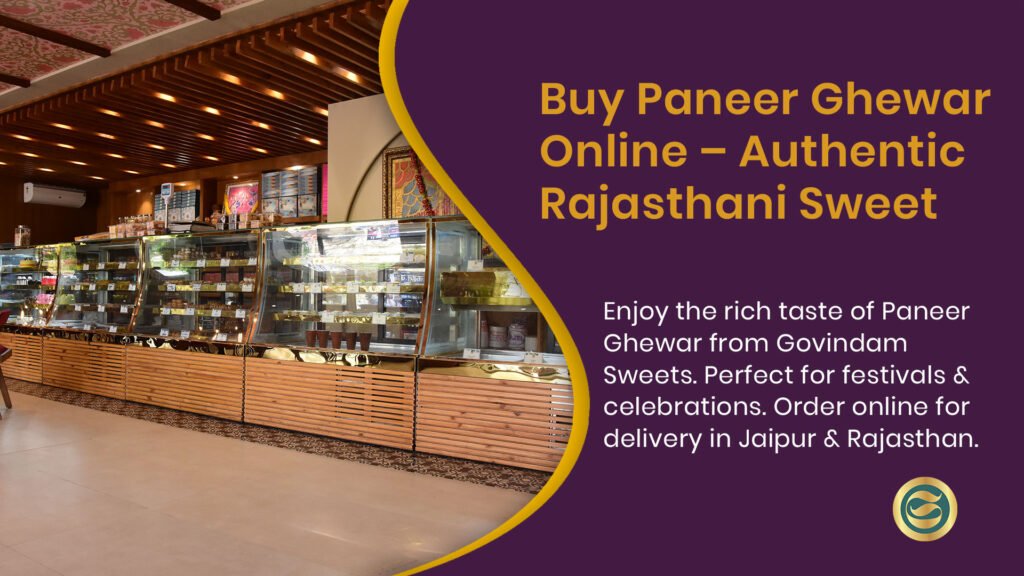Indian Sweets Dubai: Ultimate Guide to Authentic Mithai

Discover Dubai’s finest Indian sweets from melt-in-your-mouth gulab jamun to creamy rasmalai and decadent barfi. This comprehensive guide explores where to find authentic Indian Sweets Dubai establishments, convenient delivery options, traditional recipes to make at home, and the cultural significance behind these beloved desi treats.
Indian Sweets Dubai: A Taste of Authentic Tradition
Dubai’s cosmopolitan food landscape features an impressive array of Indian Sweets Dubai establishments serving up authentic mithai that transport you straight to the streets of Delhi, Mumbai, or Kolkata. These traditional confections combine ingredients like milk, sugar, ghee, flour, and nuts to create distinctive flavors and textures that have captivated dessert lovers across cultures and generations.
The Indian Sweets Dubai scene has flourished in recent years, with market research indicating a 38% increase in specialized mithai shops since 2023. Consequently, this expansion reflects both Dubai’s large South Asian expatriate population and growing appreciation for Indian desserts among other communities. Moreover, the quality and authenticity of Indian sweets available throughout the emirate have reached unprecedented levels.
“What makes Indian Sweets Dubai so special is the combination of authentic recipes and high-quality ingredients,” explains Chef Rajesh Sharma, culinary director at Royal Mithai. “Furthermore, skilled halwais (sweet makers) bring decades of experience and traditional techniques that simply cannot be replicated without proper training.”
Growing Popularity and Market Expansion
This comprehensive guide explores everything you need to know about Indian sweets in Dubai. First, we’ll discover the rich variety of traditional mithai available. Then, we’ll examine the best places to purchase these delicacies. Additionally, we’ll cover top delivery options for enjoying these treats at home. Finally, we’ll share authentic recipes for those who wish to create Indian Sweets Dubai in their own kitchens.
According to the Dubai Department of Economic Development, Indian restaurants and sweet shops represent one of the fastest-growing segments in the food sector, with over 120 dedicated mithai establishments now operating across the emirate. Meanwhile, online searches for “Indian Sweets Dubai” have increased by 45% year-over-year, highlighting the growing interest in these traditional confections among Dubai residents and visitors.
The Cultural Significance of Indian Sweets
Indian Sweets Dubai offerings carry deep cultural meaning beyond their delicious flavors:
- Celebration markers: Specific sweets associated with festivals, weddings, and special occasions
- Religious significance: Many sweets prepared as offerings in religious ceremonies
- Regional identity: Different varieties representing distinct regions of India
- Family traditions: Recipes passed through generations, preserving cultural heritage
- Symbol of hospitality: Offering mithai to guests represents warmth and welcome
“In Indian culture, sweets are much more than just desserts,” notes cultural historian Dr. Anand Kapoor. “As a result, specific mithai varieties become intertwined with life’s milestone moments. Moreover, the sharing of Indian Sweets Dubai during festivals and celebrations strengthens community bonds and passes traditions to younger generations.”
Historical Evolution of Mithai
The tradition of Indian sweets dates back thousands of years, with references found in ancient texts and historical records. Initially, sweets were primarily made from raw sugar (jaggery) and various grains. Subsequently, the introduction of refined sugar and techniques from Persian and Central Asian influences during the Mughal era transformed Indian confectionery. Furthermore, regional variations developed as different parts of India adapted these sweets to local ingredients and preferences.
A Journey Through Regional Flavors
The world of Indian Sweets Dubai reflects India’s remarkable regional diversity. On one hand, North Indian traditions contribute ghee-rich ladoos and milk-based treats like gulab jamun and rasmalai. On the other hand, East Indian specialties include distinctive sandesh and rasgulla from Bengal. Meanwhile, South Indian traditions bring unique offerings like mysore pak and various halwas. Furthermore, Western Indian specialties such as mohanthal and basundi add to the rich tapestry of flavors. This extraordinary variety ensures that Indian Sweets Dubai establishments offer something to satisfy every sweet tooth, regardless of personal preference.
Most Popular Indian Sweets Dubai Varieties
The world of Indian Sweets Dubai encompasses numerous distinctive treats:
Milk-Based Indian Confections
These creamy delicacies showcase the versatility of milk:
- Gulab Jamun – These soft, spongy balls soaked in rose-scented sugar syrup represent one of the most beloved Indian Sweets Dubai offerings. Made from khoya (reduced milk solids) and deep-fried to golden perfection, their melt-in-your-mouth texture and sweet aromatic flavor make them perennial favorites.
- Rasmalai – This elegant Indian Sweets Dubai treat features soft cheese patties soaked in cardamom-infused milk, often garnished with pistachios and saffron. The contrast between the delicate cheese dumplings and the richly flavored milk creates a sophisticated dessert experience.
- Barfi – Available in countless varieties including plain, pista (pistachio), and chocolate, this fudge-like Indian Sweets Dubai creation has a dense, smooth texture and sweet, milky flavor. Often decorated with edible silver vark, it’s as beautiful as it is delicious.
- Kalakand – This grainy milk cake combines the richness of khoya with the slight tanginess of paneer (Indian cottage cheese), creating a distinctive Indian Sweets Dubai option with complex flavor and texture profiles that showcase milk in multiple forms.
“The milk-based Indian Sweets Dubai require extraordinary patience and skill,” explains mithai master Mohan Lal. “Therefore, these recipes often involve continuous stirring for hours to achieve the perfect consistency. Additionally, the quality of milk dramatically impacts the final result, which is why premium shops often source specific milk varieties for their creations.”
Gram Flour and Wheat-Based Delights
These distinctive treats utilize flours in creative ways:
- Ladoo – These spherical sweets come in numerous varieties including boondi (tiny gram flour droplets), besan (gram flour), and atta (wheat flour). As one of the most popular Indian Sweets Dubai options, they’re often prepared for religious occasions and celebrations.
- Jalebi – These crispy, syrup-soaked spirals made from fermented wheat batter offer an irresistible combination of crunchy exterior and syrupy interior. Often enjoyed hot, they’re among the most recognizable Indian Sweets Dubai offerings.
- Mysore Pak – This rich sweet from South India features gram flour, ghee, and sugar cooked together to create a dense, fudge-like consistency that literally melts in your mouth. The best Indian Sweets Dubai shops prepare it with generous amounts of ghee for authentic texture.
- Gujiya – These crescent-shaped pastries filled with sweetened khoya, nuts, and cardamom are particularly popular during festivals. Their delicate, flaky exterior contrasts beautifully with the rich filling, showcasing the diverse textures possible in Indian Sweets Dubai.
For those seeking authentic Indian Sweets Dubai with special seasonal varieties, Festival Special collections offer limited-edition treats during Diwali, Holi, and other significant Indian celebrations.
Nut and Seed-Based Indian Confections
These rich treats showcase the distinctive flavors of nuts and seeds:
- Kaju Katli – These diamond-shaped cashew fudge slices represent premium Indian Sweets Dubai offerings, often featuring delicate silver vark decoration. Their melt-in-your-mouth texture and rich cashew flavor make them particularly popular as gifts.
- Chikki – These brittle-like confections combine jaggery with nuts or seeds (commonly peanuts, sesame, or coconut) to create a sweet with satisfying crunch and complex caramel notes from the unrefined sugar.
- Sohan Papdi – This flaky, thread-like sweet offers distinctive texture and rich flavor from ghee and nuts. Its unique preparation method creates a confection unlike any other in the Indian Sweets Dubai repertoire.
- Gond Ke Ladoo – These nutritive treats feature edible gum crystal combined with nuts, seeds, and jaggery, traditionally prepared during winter for their warming properties. They showcase how Indian sweets often incorporate Ayurvedic principles.
“The nut-based Indian Sweets Dubai offerings often represent the premium category,” notes confectionery expert Anjali Patel. “As a result, these sweets frequently feature in special gift boxes and wedding mithai selections. Moreover, the intricate preparation and expensive ingredients make these varieties particularly special for celebrations and important occasions.”
Where to Find the Best Indian Sweets Dubai Establishments
Dubai offers numerous exceptional venues for authentic Indian confections:
Traditional Mithai Shops
These specialized establishments focus exclusively on authentic recipes:
- Royal Indian Sweets – Operating in Dubai since 1997, this venerable institution offers over 100 varieties of Indian Sweets Dubai made fresh daily using traditional methods. Their gulab jamun and kaju katli are particularly renowned for authentic preparation and premium ingredients. Indeed, their commitment to freshness means they produce multiple batches throughout the day rather than making large quantities in advance.
- Bikanervala – This famous Indian sweet chain brings decades of expertise to Dubai with an extensive selection of Indian Sweets Dubai including regional specialties from across the subcontinent. Their consistency across multiple branches ensures reliable quality. Additionally, their transparent kitchen concept allows customers to observe mithai being prepared, building trust in their authentic methods.
- Mithaiwala – Specializing in North Indian varieties of Indian Sweets Dubai, this popular shop in Karama offers both classic recipes and innovative fusion creations that blend traditional techniques with modern presentations. In fact, their seasonal menu changes regularly to incorporate fresh ingredients at their peak quality while maintaining core favorites year-round.
- Bengali Sweet House – Showcasing East Indian specialties, this authentic shop offers regional Indian Sweets Dubai like sandesh and rasgulla rarely found elsewhere in the city, attracting customers seeking specific regional varieties. As a matter of fact, they employ halwais from Kolkata to ensure complete authenticity in their preparation methods.
Modern Indian Dessert Boutiques
Several upscale venues have elevated traditional sweets to art forms:
- Mithai by Copper Chimney – This premium establishment offers Indian Sweets Dubai with luxury packaging ideal for gifts, featuring international-standard presentation while maintaining authentic flavors and preparation methods. Not only do they use premium ingredients, but they also create visually stunning presentations that appeal to Dubai’s sophisticated consumers.
- Sweet Bengal – Offering sophisticated presentation of traditional Bengali sweets, this boutique focuses on lighter, less sweet Indian Sweets Dubai options that appeal to contemporary tastes while honoring traditional recipes. In particular, their commitment to reducing sugar content without compromising flavor has earned them a loyal health-conscious clientele.
- Rajdhani Sweets – This modern interpretation of a classic sweet shop offers both traditional and innovative Indian Sweets Dubai creations, with transparent ingredient listings and modern packaging designed for Dubai’s cosmopolitan customers. Notably, their online ordering system features detailed descriptions of each sweet’s regional origin and cultural significance, adding educational value to the culinary experience.
- Chappan Bhog – Named for the traditional “56 offerings” in Indian culture, this comprehensive Indian Sweets Dubai destination offers both ready-made selections and custom orders for special occasions with attention to both authenticity and presentation. Beyond that, they specialize in creating elaborate mithai arrangements for corporate events and weddings that function as both dessert service and decorative elements.
“What distinguishes exceptional Indian Sweets Dubai establishments is their commitment to freshness and traditional methods,” explains food critic Ibrahim Al-Youssef. “Therefore, the finest venues prepare small batches throughout the day rather than large quantities stored for extended periods. Additionally, they use high-quality ghee, nuts, and milk, avoiding artificial flavors or preservatives that compromise authentic taste.”
Indian Sweets Dubai Delivery Options
For those preferring to enjoy mithai at home, numerous options bring these delicacies to your door:
Specialized Indian Dessert Delivery
Several businesses focus exclusively on delivering Indian confections:
- Mithai Express – Offering same-day delivery of fresh Indian Sweets Dubai with ordering available until 4 PM, this specialized service ensures authentic sweets reach customers in perfect condition through temperature-controlled transport.
- Sweet India Direct – This delivery service offers Indian Sweets Dubai from multiple vendors through a single ordering platform, allowing customers to compare offerings and combine items from different specialists in one delivery.
- Celebration Sweets – Specializing in large orders for special occasions, this Indian Sweets Dubai delivery service provides customized sweet boxes for weddings, corporate events, and festivals with attention to presentation and packaging.
Mainstream Platforms with Indian Sweets Selections
Major food delivery services have embraced the Indian Sweets Dubai category:
- Talabat – Features a dedicated “Indian Sweets” category highlighting the best mithai vendors across Dubai with detailed descriptions and customer ratings helping newcomers discover authentic options.
- Deliveroo – Their “Sweet Treats” section includes numerous Indian Sweets Dubai vendors with transparent ingredient listings and estimated delivery times based on your location.
- Careem – Offers rapid delivery from selected premium Indian Sweets Dubai establishments with real-time order tracking and special packaging options for gift deliveries.
“The quality of packaging and temperature control significantly impacts Indian Sweets Dubai delivery success,” notes logistics specialist Omar Fareed. “As a result, reputable services use specialized containers to maintain delicate textures during transport. Moreover, many milk-based sweets require refrigeration while others are best at room temperature, creating complex delivery requirements that specialized services are equipped to manage.”
For entrepreneurs interested in starting their own Indian sweets business, various established brands offer Franchise Details for mithai shop concepts with proven success in the Dubai market.
Make Your Own Indian Sweets Dubai: Traditional Recipes
Creating authentic Indian desserts at home allows for customization and the satisfaction of preserving cultural traditions:
Essential Indian Dessert Ingredients
Stocking these staples prepares your kitchen for most Indian Sweets Dubai recipes:
- Khoya/Mawa: Reduced milk solids central to many recipes
- Ghee: Clarified butter providing distinctive flavor and texture
- Cardamom, saffron, and rose water: Key flavoring agents
- Gram flour (besan): Base for many traditional sweets
- Nuts: Particularly cashews, pistachios, and almonds
“Quality ingredients make all the difference in homemade Indian Sweets Dubai recipes,” advises home chef Anjali Shah. “Consequently, invest in fresh cardamom rather than pre-ground powder, high-quality ghee, and good nuts. Furthermore, taking time to properly prepare base ingredients like khoya will significantly enhance your final results.”
Preparation Techniques and Tips
Mastering a few key techniques will dramatically improve your homemade Indian sweets:
- Proper sugar syrup consistency: Different sweets require different syrup densities
- Continuous stirring discipline: Many recipes require constant attention to prevent burning
- Temperature control: Managing heat appropriately prevents scorching or undercooking
- Resting times: Following recommended cooling or setting periods ensures proper texture
- Traditional shaping methods: Using proper techniques for forming sweets like ladoos or barfi
“Patience is perhaps the most important ingredient in Indian sweet making,” explains culinary instructor Meena Patel. “In addition, developing an eye for visual cues like color changes and texture development is essential. Therefore, start with simpler recipes to build confidence before attempting more complex creations.”
Simple Homemade Gulab Jamun
This classic can be created in your own kitchen:
Ingredients:
- 1 cup milk powder
- 3 tbsp all-purpose flour
- 1/4 tsp baking soda
- 2 tbsp ghee
- 4-5 tbsp milk for kneading
- Oil for deep frying
For the syrup:
- 2 cups sugar
- 2 cups water
- 4-5 cardamom pods, crushed
- 1 tsp rose water
Method:
- Mix milk powder, flour, and baking soda in a bowl.
- Add ghee and mix until it resembles breadcrumbs.
- Gradually add milk to form a soft dough. Do not overknead.
- Rest the dough covered for 10 minutes.
- Meanwhile, prepare syrup by boiling sugar and water with cardamom for 5-7 minutes.
- Turn off heat and add rose water to the syrup.
- Divide dough into small balls, ensuring no cracks.
- Heat oil on medium-low and gently fry the balls until golden brown.
- Immediately transfer hot jamuns to warm syrup.
- Soak for at least 2 hours before serving.
This homemade version delivers authentic Indian Sweets Dubai flavor that rivals professional productions, particularly when using high-quality ingredients.
Easy Besan Ladoo Recipe
This simple sweet makes a perfect introduction to Indian dessert preparation:
Ingredients:
- 2 cups gram flour (besan)
- 1 cup ghee
- 1 cup powdered sugar
- 1/2 tsp cardamom powder
- 2 tbsp chopped nuts (optional)
Method:
- Heat ghee in a heavy-bottomed pan.
- Add gram flour and roast on low-medium heat, stirring continuously.
- Continue roasting until the mixture turns golden brown and releases a nutty aroma (approximately 15-20 minutes).
- Let the mixture cool until just warm to touch.
- Add powdered sugar, cardamom, and nuts if using.
- Mix well and form into round ladoos while still warm.
“Homemade Indian Sweets Dubai recipes often require patience and attention,” suggests culinary instructor Priya Patel. “Therefore, maintain low heat and continuous stirring for recipes like besan ladoo to prevent burning. Additionally, forming the ladoos while the mixture is still warm ensures they hold their shape properly.”
Seasonal and Festive Indian Sweets
Indian confections play central roles in celebrations and festivals:
Diwali Special Mithai
The Festival of Lights features distinctive sweets:
- Kaju Katli – Diamond-shaped cashew fudge often adorned with silver vark
- Motichoor Ladoo – Tiny gram flour bead ladoos with distinctive orange color
- Soan Papdi – Flaky, melt-in-mouth sweet made from gram flour and sugar
- Jalebi – Crispy, syrup-soaked spirals symbolizing prosperity
“Diwali without special Indian Sweets Dubai is unimaginable,” explains cultural expert Meera Singh. “Consequently, mithai shops prepare weeks in advance for this peak season. Moreover, specific varieties like kaju katli and motichoor ladoo become especially popular during this festival, with many families placing large advance orders to ensure availability.”
Wedding and Celebration Confections
Indian weddings incorporate specific sweets:
- Imarti – Intricate, pretzel-shaped sweet made from lentil flour and soaked in sugar syrup
- Malpua – Sweet pancakes soaked in syrup and topped with reduced milk
- Moong Dal Halwa – Rich, ghee-laden sweet made from yellow lentils
- Personalized Sweet Boxes – Custom mithai collections as wedding favors
“Wedding-associated Indian Sweets Dubai go beyond mere desserts to become part of the ceremony itself,” notes wedding planner Ritu Chawla. “As a result, families often commission custom sweet boxes featuring bride and groom’s names. Furthermore, specific varieties are prepared for pre-wedding functions, creating a progression of sweets that accompanies the entire celebration sequence.”
The Health Perspective on Indian Sweets
Traditional mithai offers both nutritional considerations and occasional benefits:
Nutritional Aspects
Understanding the health implications of Indian Sweets Dubai:
- Sugar and fat content: Traditional recipes often feature significant amounts of both
- Nutrient-rich ingredients: Many sweets incorporate milk, nuts, and ghee with nutritional benefits
- Portion tradition: Authentic serving sizes tend to be smaller than Western desserts
- Seasonal benefits: Some varieties like gond ladoos contain ingredients chosen for specific health properties
- Ayurvedic connections: Many sweets incorporate ingredients valued in traditional Indian medicine
“Indian Sweets Dubai can be enjoyed as part of a balanced diet when consumed mindfully,” advises nutritionist Dr. Huda Mahmoud. “As a result, focus on authentic, freshly-made varieties in moderate portions. Moreover, many traditional mithai recipes incorporate ingredients with genuine nutritional value like milk protein, nut-based healthy fats, and warming spices with digestive benefits.”
Modern Adaptations for Health-Conscious Consumers
Several establishments now offer modified Indian Sweets Dubai options:
- Reduced-sugar versions – Using less sugar while maintaining authentic flavors
- Jaggery-sweetened alternatives – Substituting refined sugar with less processed options
- Baked rather than fried preparations – Reducing oil content in applicable recipes
- Portion-controlled packaging – Single-serving options encouraging moderation
- Diabetic-friendly adaptations – Specially formulated recipes for those with blood sugar concerns
Meanwhile, these adaptations maintain cultural authenticity while addressing contemporary health concerns. Furthermore, some traditional recipes naturally align with modern nutritional guidance. Additionally, the emphasis on fresh, whole-food ingredients in authentic preparations provides advantages over highly processed commercial desserts.
The Future of Indian Sweets in Dubai
Several trends are shaping the evolution of this cherished culinary tradition:
Innovation While Honoring Tradition
Contemporary approaches create new excitement around Indian Sweets Dubai:
- Fusion creations – Combining Indian sweet techniques with global flavors
- Artisanal presentation – Elevating traditional recipes through sophisticated packaging and design
- Single-origin ingredients – Highlighting specific regional milk, nuts, or sugar sources
- Organic and natural options – Premium versions using organic dairy and unrefined sweeteners
- Chef collaborations – Limited-edition creations from partnerships between traditional halwais and innovative pastry chefs
“Dubai’s dynamic culinary scene encourages thoughtful innovation in Indian Sweets Dubai,” observes food trend analyst Zainab Al-Attas. “As a result, we’re seeing exciting reimaginations that respect tradition. Moreover, these innovations often introduce mithai to younger generations or international visitors who might otherwise overlook these classic treats.”
Expanding Global Appreciation
Indian sweets increasingly reach beyond traditional markets:
- Cross-cultural discovery – Non-South Asian Dubai residents exploring mithai
- Tourism connection – Visitors seeking authentic culinary experiences
- Corporate gifting – Indian sweets gaining popularity for business relationships
- Mithai education – Tastings and workshops introducing newcomers to these traditional confections
- Social media visibility – Visually striking sweets gaining attention online
“As Dubai continues developing as a global culinary destination, Indian Sweets Dubai establishments are finding new audiences,” explains hospitality consultant Ahmed Al-Mansoori. “Consequently, premium presentation and educational elements are becoming increasingly important. Furthermore, as international visitors discover these unique confections, the market continues expanding beyond the traditional South Asian customer base.”
Conclusion: Sweet Traditions in a Modern City
The rich tradition of Indian Sweets Dubai represents a perfect intersection of culinary artistry, cultural heritage, and community celebration. From the syrup-soaked indulgence of gulab jamun to the delicate elegance of kaju katli, these desserts tell the story of India through flavor, texture, and aroma.
Whether you’re seeking to purchase from Dubai’s finest mithai shops, have these treats delivered to your door, or recreate authentic recipes in your own kitchen, the world of Indian sweets offers endless opportunities for sweet discovery. The careful balance of milk, sugar, ghee, nuts, and spices creates distinctive taste experiences that have captivated dessert lovers for centuries.
As Dubai continues its remarkable development as a global culinary destination, its Indian sweet shops remain cherished connections to South Asian heritage. These beloved treats serve as delicious reminders of the cultural richness that immigrant communities bring to the emirate, creating a sweetness that transcends mere sugar to encompass tradition, celebration, and shared human experience.
Frequently Asked Questions About Indian Sweets Dubai
What are the most popular Indian sweets to try in Dubai?
The must-try Indian Sweets Dubai offerings include gulab jamun (deep-fried milk solids soaked in rose-scented syrup), jalebi (crispy, syrup-soaked spirals), rasmalai (cheese dumplings in cardamom-flavored milk), barfi (milk-based fudge available in various flavors), and ladoo (spherical sweets with numerous regional variations). For beginners, mixed sweet boxes from established shops like Royal Indian Sweets or Bikanervala offer an excellent introduction to these diverse confections. Most traditional sweet shops offer sampling options before purchase, allowing you to discover your personal favorites among the extensive variety available throughout Dubai.
How long do Indian sweets typically stay fresh?
Most Indian Sweets Dubai have relatively short shelf lives compared to Western desserts. Milk-based sweets like rasmalai, kalakand, and gulab jamun typically stay fresh for 2-3 days when refrigerated, while drier varieties like kaju katli and besan ladoo can last 7-10 days when stored in airtight containers at room temperature. For fried items like jalebi, same-day consumption provides the optimal experience, as texture degrades quickly after preparation. Premium mithai shops typically prepare fresh batches daily and will advise on specific storage requirements and consumption timeframes for each variety. For maximum freshness, purchase smaller quantities more frequently rather than larger amounts less often.
Can I find diabetic-friendly Indian sweets in Dubai?
Yes, several Indian Sweets Dubai establishments now offer diabetic-friendly options. Royal Sweet Mart in Bur Dubai offers a dedicated “Sugar-Free” section featuring adaptations of popular items like barfi and ladoo made with approved sugar substitutes. Puranmal Sweets prepares specific diabetic-friendly versions upon request with advance notice. Modern sweet shops like Mithai Genie clearly label diabetic-suitable options and provide complete nutritional information. While these adaptations reduce glycemic impact, they typically still contain carbohydrates from milk and flour, so portion control remains important. For those managing diabetes, consulting with healthcare providers about incorporating these modified sweets into meal plans is advisable.
What’s the difference between North and South Indian sweets?
Indian Sweets Dubai offerings reflect distinct regional characteristics. North Indian sweets predominantly feature milk solids (khoya), with richer ghee content and aromatic spices like cardamom and saffron. Popular examples include gulab jamun, rasmalai, and various barfis. South Indian varieties often incorporate rice flour, jaggery (unrefined palm sugar), and coconut, creating distinctive treats like mysore pak, poli (sweet stuffed flatbread), and various payasams (puddings). The cooking techniques also differ, with North Indian sweets frequently deep-fried then soaked in syrup, while South Indian varieties often steam ingredients or cook them directly with jaggery. Both traditions are well-represented in Dubai’s diverse Indian sweet shops, offering opportunities to explore regional specialties.
What are the best Indian sweets for gifting in Dubai?
For gifting purposes, premium Indian Sweets Dubai options like kaju katli (cashew fudge), assorted barfi, and motichoor ladoo present particularly well. These varieties travel well, maintain freshness for several days, and have broad appeal across different palates. Shops like Bikanervala, Royal Indian Sweets, and Puranmal offer specialized gift boxes in various price ranges, often with elegant packaging suitable for corporate gifts or special occasions. During festive seasons like Diwali, most shops create special gift hampers combining premium sweets with dry fruits and chocolates. For international shipping, shelf-stable varieties like soan papdi and kaju katli are most suitable, with shops like Rajdhani Sweets offering vacuum-packed options specifically designed for long-distance gifting.
Are traditional Indian sweets typically vegetarian?
Yes, the vast majority of Indian Sweets Dubai offerings are vegetarian, making them suitable for those following vegetarian diets. Most traditional mithai is made from milk, sugar, flour, ghee (clarified butter), and nuts – all vegetarian ingredients. However, they are not typically vegan due to the central role of dairy products. Some specific varieties like bal mithai from Uttarakhand might use animal-derived colorings, but these are rare in Dubai’s commercial offerings. For strict vegetarians concerned about rennet (animal-derived enzyme sometimes used in cheese production), inquire specifically about paneer-based sweets, as most traditional Indian preparations use vegetarian acid-set methods rather than rennet for making cheese components.












